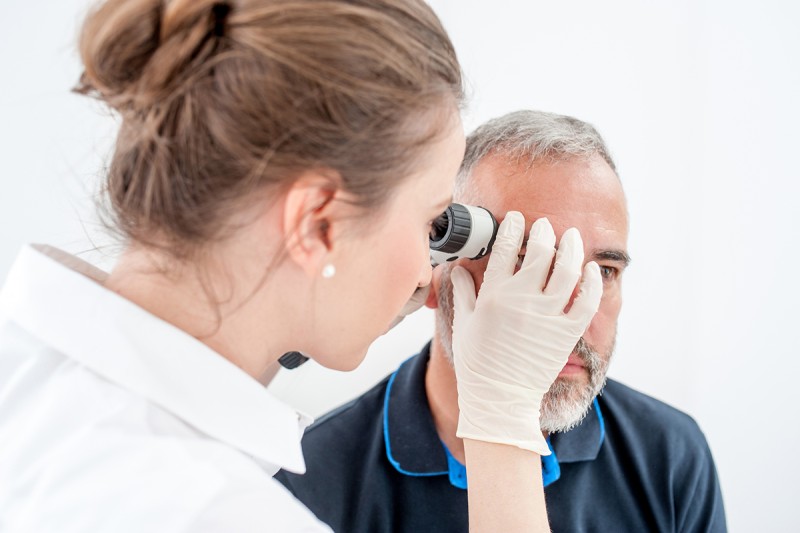
Merkel cell carcinoma (MCC), a rare and aggressive type of skin cancer, is highly treatable if caught early. For people whose disease has metastasized, or spread, it’s a different story. Tumors often respond to chemotherapy by shrinking, but only for a short time before they start growing again.
Recently, new hope has emerged for people with metastatic MCC. In March 2017, the US Food and Drug Administration approved the immunotherapy drug avelumab (Bavencio®) for people with metastatic disease who had previously received chemotherapy. It was the first FDA-approved drug for metastatic MCC. The approval came after an international phase II clinical trial showed that about one-third of people responded to avelumab. Unlike with chemotherapy, the benefit appears to be lasting.
A second stage of the clinical trial has now found that avelumab might be even more effective as an initial treatment. Results reported in JAMA Oncology show that 62% of people with metastatic MCC who received avelumab as their first treatment had their tumors shrink.
“This is important progress in managing this cancer, which hasn’t had a good treatment option for the advanced stage,” says Memorial Sloan Kettering medical oncologist Sandra D’Angelo. She is a corresponding author of the JAMA Oncology study and led the MSK portion of the multisite trial.
An Immune Component
Merkel cells are located in the outermost layer of the skin and are mainly touch receptors. Merkel cell tumors typically begin on sun-exposed parts of the body, such as the face and neck. Their shape and color are less distinctive than other skin cancers, so people usually only notice them because of rapid growth. The disease is diagnosed in just 1,500 people each year in the United States, and in about 10% of those people, it has already spread.
Despite its rarity, MCC has been well studied. Researchers suspect that some loss of immune function plays a critical role in triggering the cancer. About 80% of people with the disease have a virus called Merkel cell polyomavirus, and MCC is more likely to develop in people with a weakened immune system.
“Like with most cancers, we think it’s not just one factor alone that causes the disease. It’s due to multiple hits,” Dr. D’Angelo says. “Someone may get the virus, then they get older and their immune system weakens, or they have sun exposure over the years that causes further DNA damage, and normal Merkel cells become cancerous.”
Evidence of an immune component in MCC prompted researchers and pharmaceutical companies to test avelumab for the disease. Avelumab is a type of drug called a checkpoint inhibitor. It targets a molecule called PD-L1, which is part of the surface of some cancer cells and immune cells and prevents the immune system from recognizing that the cancer cells pose a threat. By binding to PD-L1, avelumab takes the brakes off the immune system and allows it to attack the cancer.
Avelumab was already being tested in a variety of cancers, including melanoma, gastric (stomach) cancer, lung cancer, and ovarian cancer. Merck KGaA and Pfizer funded a large trial to test its effectiveness in people with metastatic MCC.
More Effective as Initial Treatment for MCC
The first part of the phase II trial, which led to the FDA approval, involved only people with metastatic MCC who had not responded to chemotherapy. The response rate in this group was approximately 33%. The FDA requested a second part to the trial, which Dr. D’Angelo led, to look at avelumab strictly as an initial therapy in an additional 112 people.
Early results from the first 39 people in the second part of the trial were striking. The response rate to avelumab, 62%, was almost double the response rate in the original group. This suggested that avelumab might be much more effective if given as an initial treatment.
Dr. D’Angelo adds that further research will study ways to identify who is more likely to benefit from avelumab to start. “We’re still helping only about 60% of people with disease that has spread, which highlights a need for us to understand more about it,” she explains.
Researchers also will explore combining avelumab with other immunotherapy drugs. This strategy has been effective against other cancers, especially melanoma.
Expanding Research Efforts to Earlier-Stage MCC
In addition, a new clinical trial is about to start that will test whether avelumab can help those with MCC at an earlier stage. People who have had MCC surgically removed but are at a high risk of the disease coming back may be able to reduce their risk with avelumab. MSK is participating in this trial under the direction of medical oncologist Ciara Kelly.
“This has been such an encouraging development for this disease,” Dr. D’Angelo says. “When I first started treating people with Merkel cell carcinoma at MSK, the only thing I had to offer them was chemotherapy, and I knew how limited the benefit would be. It is great to have this therapy that’s available to block tumor growth and potentially allow people to live longer.”


